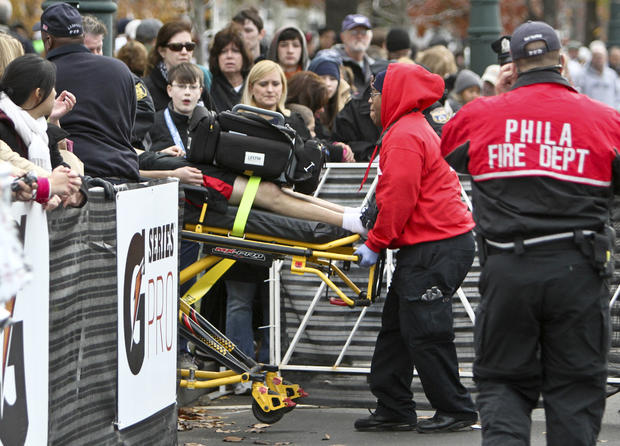Marathon runners don't face major heart risks, study shows
(CBS/AP) The sight of a marathon runner collapsing or being carted off in a stretcher can be scary to say the least, but a new study might ease some worries for people considering running long distances.
The study found the odds of a long distance runner suffering a cardiac arrest or dying are extremely low unless you have a pre-existing medical condition.
PICTURES: NYC marathon's oldest runners: How'd they do?
The study did however show that as more runners are trying to go the distance these days to stay fit, the number of incidences of marathoners suffering a cardiac arrest is on the rise.
"You hear about this more and more," said study author Dr. Aaron Baggish, associate director of the cardiovascular performance program at Massachusetts General Hospital in Boston. Baggish's group works with athletes with heart conditions.
For the study, published in the Jan. 12 issue of the New England Journal of Medicine, researchers looked at nearly 11 million runners who participated in marathons or half-marathons between 2000 and 2010.
After scouring media reports and interviewing medical staff who worked some of the races, the researchers flagged 59 cases of cardiac arrest where a runner became unconscious with no pulse during the race or within an hour of crossing the finish line. Cardiac arrest is when the heart stops because of a heart attack, a rhythm problem or another disorder.
Out of all of the runners studied, 42 people died. That overall figures translate to 1 cardiac arrest per 184,000 participants and 1 death per 259,000 participants, the researchers said. Those numbers are low compared to other athletic activities, as shown by prior studies of deaths in college athletes, triathlon participants and previously healthy middle-aged joggers, researchers said.
Fifty-one of the 59 runners who had cardiac arrest were men, and most cases involved 26.2-mile marathons rather than half-marathons.
More cardiac arrest cases occurred during 2005-2010 than in the preceding five-year span, but that's just because more people are participating in the races, Baggish said. More worrisome was the finding that among male marathoners, the rate of cardiac arrest per 100,000 runners was higher during the latter half of the decade than in the first half.
Baggish thinks that's because of a shift in attitudes about who can run long distances. Even a decade ago, marathons were considered appropriate only for very athletic people, he said. But more recently people have come to think of it as "something anyone can do," and even as a healthy activity for lowering the risk of heart disease, he said. So it has attracted people with a family history of early heart disease or early deaths, and "these are just the people who are likely to get into trouble."
Researchers could find a cause for 31 of the cardiac arrest cases, and found most were due to clogged, hardened arteries or hypertrophic cardiomyopathy, a condition that's sometimes inherited in which an unusually thick heart muscle can interfere with the pumping rhythm. Most of the victims were unaware of their pre-existing conditions, Baggish said.
What should aspiring or experienced runners do to make sure they aren't risking their health? Baggish said runners should talk to their doctors before planning to run long distances.
Dr. Gordon Tomaselli, president of the American Heart Association, said runners should also look out for signs of trouble while running such as chest pain, dizziness, lightheadedness or unusually short breath or rapid heartbeat. "You should listen to your body," he said.
Tomaselli, a heart specialist at Johns Hopkins University, called the study "reassuring" for finding so few cardiac arrests. For most people, "running a marathon, if you are so inclined, is a reasonably safe proposition," he said.
In the same issue of the journal, other doctors wrote a brief report about treating three runners who suffered heart attacks after finishing last year's Boston Marathon. None had cardiac arrest and all survived.
"We don't want to alarm people about marathon running. The benefits of exercise are well established" said one of that report's authors, Dr. Navin Kapur of Tufts Medical Center in Boston. The report shows even seasoned marathon runners can have heart attacks, something paramedics should keep in mind if a runner shows suggestive signs, he said.

